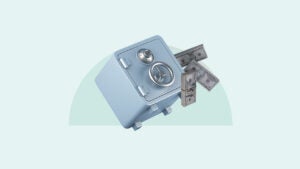The best places to save your money: Money market accounts, savings accounts and CDs

Key takeaways
- Certificates of deposit (CDs), savings and money market accounts all earn interest while keeping your money safe at federally insured banks and credit unions, but they differ in flexibility and access.
- Savings and money market accounts work best for short- to medium-term goals, since you can access funds more easily, while CDs are better for long-term goals where you won’t need the money right away.
- Money market accounts are generally best for easy access to your funds, while high-yield savings accounts may offer higher interest rates. CDs, on the other hand, make sense if you want to lock in an interest rate for a period of time.
Money market accounts, savings accounts and certificates of deposit (CDs) can all give your savings a boost by earning interest while keeping your money safe. But they differ in terms of flexibility, liquidity and features.
Understanding how these interest-bearing deposit accounts work and the differences between them can help you make the best choice about where to save and grow your cash.
The three deposit accounts we’re comparing
- Savings accounts
-
A savings account is a basic, flexible option for storing money while earning interest. They don’t usually come with checks, but you can make transfers online and sometimes withdraw at ATMs. While there are no longer federal limits on savings account transactions, some banks still limit monthly withdrawals.
- MMAs
-
MMAs are hybrid accounts you can use for both saving and spending. While they tend to earn competitive interest rates, these accounts may also come with check-writing privileges or a debit card. MMAs may have monthly withdrawal limits, depending on the bank.
- CDs
-
CDs are time-deposit accounts where you lock in money for a set period (months to years) in exchange for (typically fixed) interest. While locking in a high interest rate is tempting, you usually sacrifice liquidity for this perk. Withdrawing your CD funds early usually means paying an early withdrawal penalty.
Differences between money market, savings accounts and CDs
These are the features each type of account may have at a bank or credit union.
| Savings | Money Market | CD | |
|---|---|---|---|
| FDIC/NCUA insurance | Yes | Yes | Yes |
| Check-writing | No | Maybe* | No |
| Debit/ATM card | Not usually* | More often* | No |
| Liquidity | Yes | Yes | No |
| Limited transactions | Maybe* | Maybe* | Yes |
*It depends on the bank.
Money market account vs. CD
Unlike CDs, money market accounts typically have checking account features, such as check-writing abilities or a debit card. Though some banks may impose withdrawal limits on MMAs, you can generally access your account balance whenever you need to.
Money market accounts have variable APYs that can change at any time. Meanwhile, CD rates are usually fixed for the full term (aside from bump-up CDs).
CDs are term deposit accounts, meaning you deposit your money for a set term (often one month to 10 years) while receiving a fixed APY. In terms of liquidity, CDs are much more restrictive than MMAs. You usually have to pay an early withdrawal penalty if you withdraw money before the term is up (unless you have a no-penalty CD).
Depending on the bank, CD term and market, you may earn a higher APY than you would with a savings account or money market account.
Money market account vs. savings account
The primary differences between money market accounts and savings accounts is how you access your funds. Savings accounts allow transfers but usually don’t come with checkbooks, debit cards and ATM access. On the other hand, money market accounts are designed to make spending convenient, often providing features like debit cards and checkbooks. They may also come with higher minimum balance requirements.
Both MMAs and savings accounts offer variable interest rates, so your APY can change at any time. In exchange though, you can generally access your funds whenever you want, making both of these accounts good places to stash your emergency funds. Both MMAs and savings accounts may have monthly withdrawal limits, though these are increasingly rare.
Savings account vs. CD
Unlike CDs, savings accounts aren’t time-deposit accounts. This means you can access your account balance penalty-free whenever you want (though monthly withdrawal limits may exist). On the other hand, dipping into your CD earnings before maturity can result in early withdrawal penalties.
Another difference between savings accounts and CDs is that savings accounts have variable annual percentage yields (APYs), which can change at any time. CDs, meanwhile, offer fixed APYs for the duration of the term.
Money market account pros and cons
Pros
- MMAs can offer generous interest rates, especially if you can meet high balance requirements.
- MMAs may come with check-writing privileges, an ATM card or a debit card, providing easier access to your funds.
Cons
- Depending on where you bank, you may have monthly withdrawal limits.
- MMAs often have higher minimum balance requirements compared to CDs or savings accounts.
- Your MMA’s interest rate can drop at any time, resulting in lower interest earnings.
Savings account pros and cons
Pros
- You don’t have to commit to depositing your money for a specified period of time; you can generally access it whenever you want.
- Many high-yield savings accounts come with no monthly fees.
Cons
- You may have a monthly withdrawal limit at some banks.
- Saving accounts rarely come with checks or ATM access, making them less accessible than other types of accounts.
- Your interest rate can drop after you open an account.
Certificates of deposit (CDs) pros and cons
Pros
- Potentially higher interest than other savings options.
- CDs often come with a fixed interest rate for the length of their term, making interest earnings predictable.
- As long as you don’t withdraw your money early, you likely won’t have to pay any fees.
Cons
- By default, your money isn’t accessible before maturity — unless you make an early withdrawal and pay the appropriate fee.
- Because CD rates are fixed, you risk losing potential earnings if rates rise after you open an account.
How to choose the right account for your savings goals
Savings accounts, money market accounts, and CDs can all help you save for different financial goals. While they each have their pros and cons, you can use these accounts together to work toward your goals and maximize your earnings.
Here’s a breakdown of which account types work best for different savings goals, depending on your timeline:
- Short-term goals: A savings account or MMA is a good fit for near-term plans, like planning a vacation, buying new furniture or setting cash aside for holiday spending. You’ll have easy access to your money when you need it, without worrying about penalties.
- Medium-term goals: Both money market and savings accounts are well-suited for medium-term goals. Both accounts are flexible enough that you can tap your funds earlier than planned without penalty. But if you need steady access to cash for those goals — like putting deposits down ahead of a wedding — a money market account with checks or a debit card could be your best bet.
- Long-term goals: CDs make sense if you are saving for a goal that’s several years off, such as buying a house, purchasing a new car or funding your child’s education. CDs are especially appropriate if you have a big sum of money you can afford not to touch for a long time. If current interest rates are high and expected to drop, you can even hedge against inflation by saving with a CD.
While CD rates are fixed, money market and savings account rates fluctuate. This can make the latter two useful when rates are expected to rise. On the other hand, if rates are likely to drop — as they are in early 2026 — opening a CD can help you lock in a higher return.
Bottom line
Money market accounts, savings accounts and CDs all offer a safe way to store and grow your savings.
Money market accounts offer flexibility with check-writing and debit cards. Savings accounts are more accessible and tend to have lower fees. Finally, CDs may offer higher interest rates but have less flexibility and are best for long-term savings goals.
Choose the right account for you based on your financial goals and situation, or pick multiple to fit your savings needs.
Why we ask for feedback Your feedback helps us improve our content and services. It takes less than a minute to complete.
Your responses are anonymous and will only be used for improving our website.







